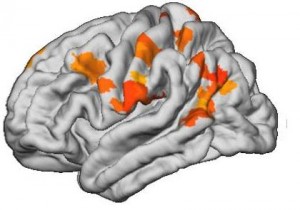TUESDAY, 8 MARCH 2011
 The researchers created detailed digital maps of test subject’s neural networks and tested their abilities to perform certain tasks. They found that brain function was affected by the brain’s tradeoff between making connections to increase neural communication and being economical with neural wiring. Those with more economical brains performed better on test tasks Journal of Neuroscience, 31(9): 3261-3270. doi: 10.1523/JNEUROSCI.4858-10.2011' target='_blank' rel='noopener noreferrer'>[1].
The researchers created detailed digital maps of test subject’s neural networks and tested their abilities to perform certain tasks. They found that brain function was affected by the brain’s tradeoff between making connections to increase neural communication and being economical with neural wiring. Those with more economical brains performed better on test tasks Journal of Neuroscience, 31(9): 3261-3270. doi: 10.1523/JNEUROSCI.4858-10.2011' target='_blank' rel='noopener noreferrer'>[1].Cost-efficiency was found to have a strong genetic basis, with 60% of the variation explicable through genetic variation. These differences in efficiency were particularly marked in certain areas of the brain, including the prefrontal cortex which carries out functions such as decision-making and planning.
These findings could have important implications not only in suggesting new directions for future brain research, but also in the understanding of mental illnesses. For example, brain network wiring was found to be significantly less cost-efficient in patients diagnosed with Schizophrenia. The research may therefore help uncover which specific genes are central to mental disorders and neurological diseases and offer new possibilities for treatments [2].
Written by Natalie Lawrence
References:
- Fornito, A., Zalesky, A., Bassett, D.S., Meunier, D., Ellison-Wright, I., Yücel, M., Wood, S.J., Shaw, K., O'Connor, J., Nertney, D., Mowry, B.J., Pantelis, C. and Bullmore, E.T. (2011). Genetic influences on cost-efficient organization of human cortical functional networks. Journal of Neuroscience, 31(9): 3261-3270. doi: 10.1523/JNEUROSCI.4858-10.2011
- http://newsroom.melbourne.edu/news/n-47
